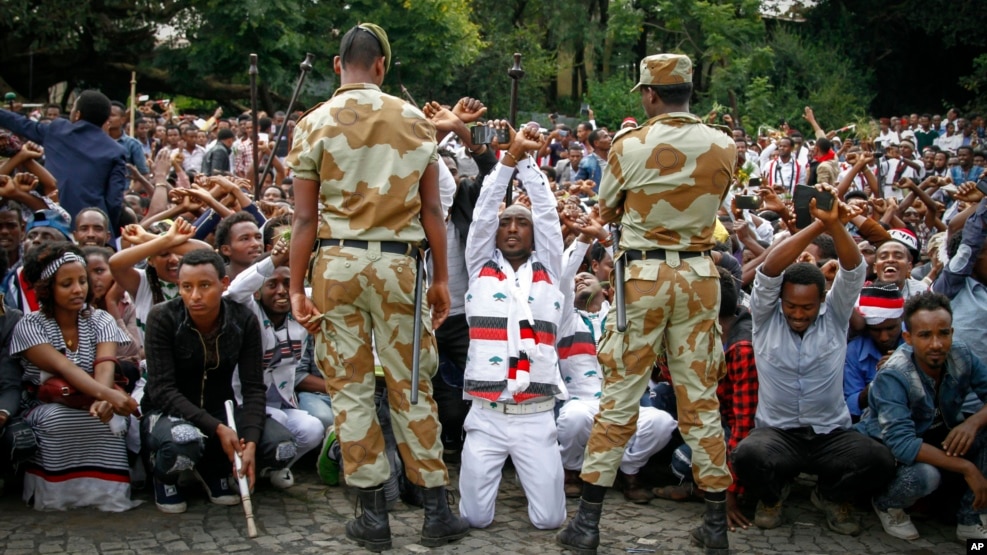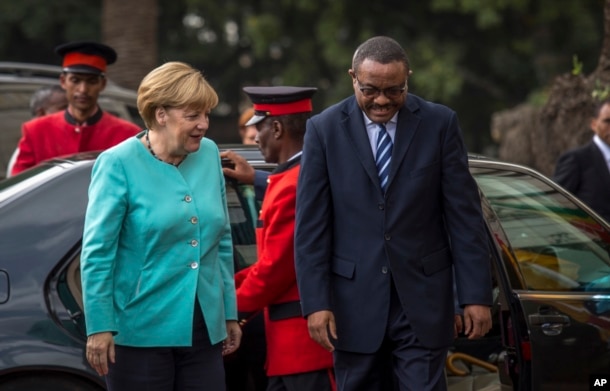
FILE - Ethiopian soldiers try to stop protesters in Bishoftu, in the Oromia region of Ethiopia.
At a European Parliament subcommittee meeting on human rights
and development, Human Rights Watch called on the European Union and
international community to take strong action against Ethiopia.
The international community has largely looked the other way when it comes to human rights abuses and limits to the freedom of expression in Ethiopia, according to international human rights groups.
The international community has largely looked the other way when it comes to human rights abuses and limits to the freedom of expression in Ethiopia, according to international human rights groups.
HRW senior researcher Felix Horne says he believes there is an
unwillingness to address hard issues with Ethiopia because it has strong relationships
with its international allies on development, migration and security.
“The European Union should be taking much stronger action on Ethiopia,
should be pushing for an international investigation; it should be pushing for
special U.N. investigators to be allowed into the country - 11 of which have
outstanding invites," Horne said. " And it should be pushing Ethiopia
to release all of those arbitrarily detained during the protests.”
Protests for wider political freedoms have been ongoing and led to the
Ethiopian government's recent declaration of a six-month state of emergency for
the first time in more than 20 years. Ethiopia is the largest recipient of EU
assistance. The European Union adopted a resolution last January condemning
violence used by Ethiopian security forces.

German Chancellor Angela Merkel, left, is welcomed by Ethiopia's Prime Minister Hailemariam Desalegn, as she arrives at the national palace in Addis Ababa, Ethiopia, Oct. 11, 2016.
Merkel visit criticized
German Chancellor Angela Merkel visited Ethiopia this week. Although she refused to speak at the Ethiopian parliament for its lack of opposition members, she urged the government to open up the political space.
EU Parliament member Ana Gomes led an observer mission during Ethiopia's contested and bloody 2005 elections. She describes Merkel's decision to go to Ethiopia as regrettable.
German Chancellor Angela Merkel visited Ethiopia this week. Although she refused to speak at the Ethiopian parliament for its lack of opposition members, she urged the government to open up the political space.
EU Parliament member Ana Gomes led an observer mission during Ethiopia's contested and bloody 2005 elections. She describes Merkel's decision to go to Ethiopia as regrettable.
“It was important the message she passed that indeed there must be
dialogue and open space for opposition and activists and critics of the
government to exist," Gomes said. " That is a weak message
nevertheless, because of course Germany has tremendous responsibilities in the
position of the EU toward Ethiopia.”
People in Ethiopia's Oromia region started protesting an urban expansion
plan last year.
The demonstrations have spread across the country and led to more than
500 deaths, according to rights groups. Ethiopia said this week foreign groups
are stoking unrest in an attempt to overthrow the government.
Source: voanews.com
No comments:
Post a Comment